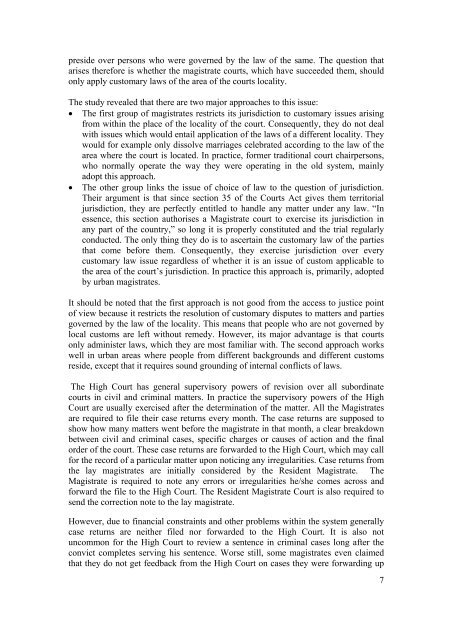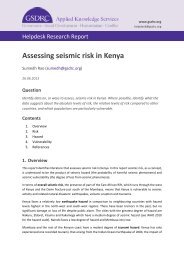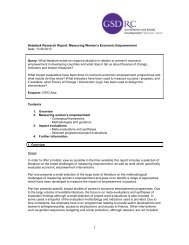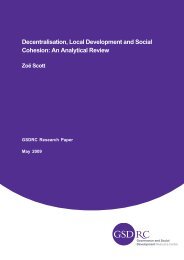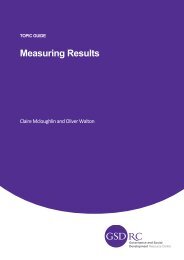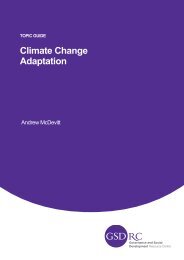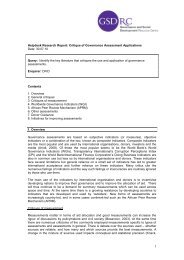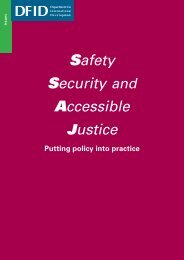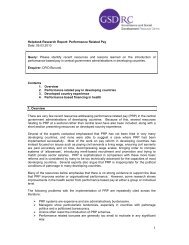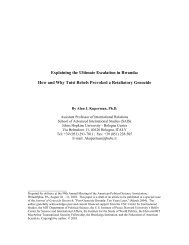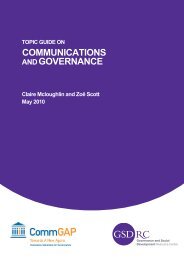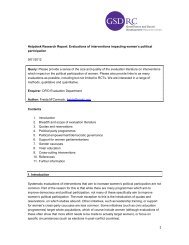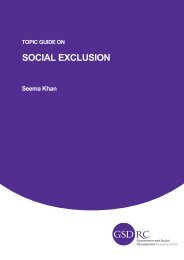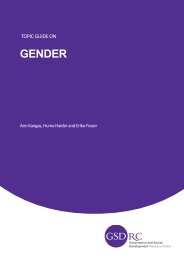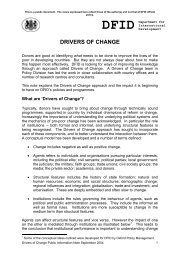ACCESS TO JUSTICE FOR THE POOR OF MALAWI? AN ... - GSDRC
ACCESS TO JUSTICE FOR THE POOR OF MALAWI? AN ... - GSDRC
ACCESS TO JUSTICE FOR THE POOR OF MALAWI? AN ... - GSDRC
- No tags were found...
Create successful ePaper yourself
Turn your PDF publications into a flip-book with our unique Google optimized e-Paper software.
preside over persons who were governed by the law of the same. The question thatarises therefore is whether the magistrate courts, which have succeeded them, shouldonly apply customary laws of the area of the courts locality.The study revealed that there are two major approaches to this issue:• The first group of magistrates restricts its jurisdiction to customary issues arisingfrom within the place of the locality of the court. Consequently, they do not dealwith issues which would entail application of the laws of a different locality. Theywould for example only dissolve marriages celebrated according to the law of thearea where the court is located. In practice, former traditional court chairpersons,who normally operate the way they were operating in the old system, mainlyadopt this approach.• The other group links the issue of choice of law to the question of jurisdiction.Their argument is that since section 35 of the Courts Act gives them territorialjurisdiction, they are perfectly entitled to handle any matter under any law. “Inessence, this section authorises a Magistrate court to exercise its jurisdiction inany part of the country,” so long it is properly constituted and the trial regularlyconducted. The only thing they do is to ascertain the customary law of the partiesthat come before them. Consequently, they exercise jurisdiction over everycustomary law issue regardless of whether it is an issue of custom applicable tothe area of the court’s jurisdiction. In practice this approach is, primarily, adoptedby urban magistrates.It should be noted that the first approach is not good from the access to justice pointof view because it restricts the resolution of customary disputes to matters and partiesgoverned by the law of the locality. This means that people who are not governed bylocal customs are left without remedy. However, its major advantage is that courtsonly administer laws, which they are most familiar with. The second approach workswell in urban areas where people from different backgrounds and different customsreside, except that it requires sound grounding of internal conflicts of laws.The High Court has general supervisory powers of revision over all subordinatecourts in civil and criminal matters. In practice the supervisory powers of the HighCourt are usually exercised after the determination of the matter. All the Magistratesare required to file their case returns every month. The case returns are supposed toshow how many matters went before the magistrate in that month, a clear breakdownbetween civil and criminal cases, specific charges or causes of action and the finalorder of the court. These case returns are forwarded to the High Court, which may callfor the record of a particular matter upon noticing any irregularities. Case returns fromthe lay magistrates are initially considered by the Resident Magistrate. TheMagistrate is required to note any errors or irregularities he/she comes across andforward the file to the High Court. The Resident Magistrate Court is also required tosend the correction note to the lay magistrate.However, due to financial constraints and other problems within the system generallycase returns are neither filed nor forwarded to the High Court. It is also notuncommon for the High Court to review a sentence in criminal cases long after theconvict completes serving his sentence. Worse still, some magistrates even claimedthat they do not get feedback from the High Court on cases they were forwarding up7


